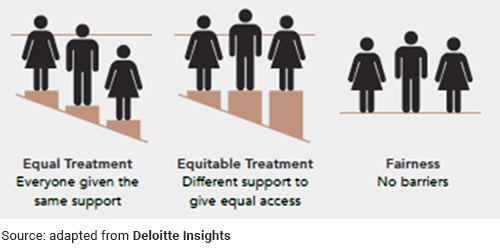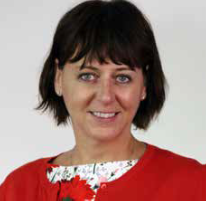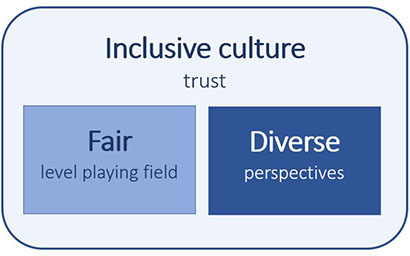In an inclusive culture there is trust, fairness, and diverse perspectives. An inclusive culture is associated with high engagement and wellbeing. It is a better place for everyone.
Everybody feels: respected and valued; treated fairly; listened to; informed; and that they have choices.
Inclusive systems level the playing field. Creating a true meritocracy to attract, develop, and retain diverse people with varied perspectives.
Our perspectives come from the sum of our parts, some of which change over time.

An inclusive culture does not dilute our perspectives by expecting us to align our views with others’. However, our values, compasses, do need to align.
Our instincts can impede inclusion. The good news is that behavioural science, widely used in finance, can help us make better talent decisions.
Inclusion maturity
Culture starts from the top, but inclusion maturity is when everyone owns it.
The Diversity Project recommends taking the Inclusive Employers Standard assessment.
Taking action
A systems redesign is needed but this can be achieved through small steps built upon progressively.
What is your context?
Base your actions on facts by gathering your data. Survey fatigue comes from a lack of action. So take time to get to the root cause of your inclusion maturity and answer the following:
- What are your granular trends across your business?
- Who is: recruited, promoted, leaving and working flexibly?
- Where are the pay gaps and why do they exist?
- What is the distribution of performance scores?
- What are your inclusion enablers?
- What are your inclusion barriers/contradictions?
Communicate (the good and the bad). Look for quick wins. Celebrate successes.
What could you do now?
Your course of action will depend on your context. You may already be doing some of the following but are they achieving the right results?
People
Inclusive leaders are kind, humble and they listen. Once people see their leaders being like this and know that they are watching out for this behaviour, positive change starts to happen.
Sponsor a task force of diverse volunteers from across the business.
A mentoring programme can help build the confidence of people from underrepresented groups to apply for roles and when they take on new roles. Mutual mentoring relationships also help participants gain a better understanding of what it is like for others to work in an organisation.
Frameworks
Long-term workforce planning widens your talent pool. Actively build a talent bench by looking widely, creatively, and proactively, including internally. Recognise that unconventional, non-linear career paths give people different perspectives.
Objectively assess candidates against no more than six essential success criteria using short, role-specific, written work samples. Administer and score these consistently, using the wisdom of the crowd by averaging independent evaluations.
Use structured interviews. For each role, use three skilled interviewers who independently score candidates before discussing whom to hire. Do not undermine the process by introducing unstructured interviews or informal references. The latter are not good predictors of job performance and can be prone to stereotypes and double standards.
Be clear and upfront about location, flexible working options and compensation ranges. Do not ask external candidates for current compensation.
What will you do now?
Fanfares can be more disturbing than motivating, mandates can feel like threats and focusing too much on outcome goals can impede progress. So, identify a few inclusion metrics to use in the background to monitor progress and determine your actions.
Find out more in the Diversity Project’s Inclusive Culture Guide for CEOs.
About the author Until she decided to take a career break, Jayne Styles was CEO of MS Amlin Investment Management and Chief Investment Officer for the wider MS Amlin group. During her career, she has also held several non-executive director/advisory roles and been an independent management consultant.
Until she decided to take a career break, Jayne Styles was CEO of MS Amlin Investment Management and Chief Investment Officer for the wider MS Amlin group. During her career, she has also held several non-executive director/advisory roles and been an independent management consultant.
She is a Meyler Campbell qualified executive coach, skills she uses as a leader, coach, and mentor. She also has an Executive MBA from Cranfield School of Management. She leads the Diversity Project’s Inclusive Recruitment Initiative and is co-lead of the Ambassadors’ Programme.
© 2022 funds europe





